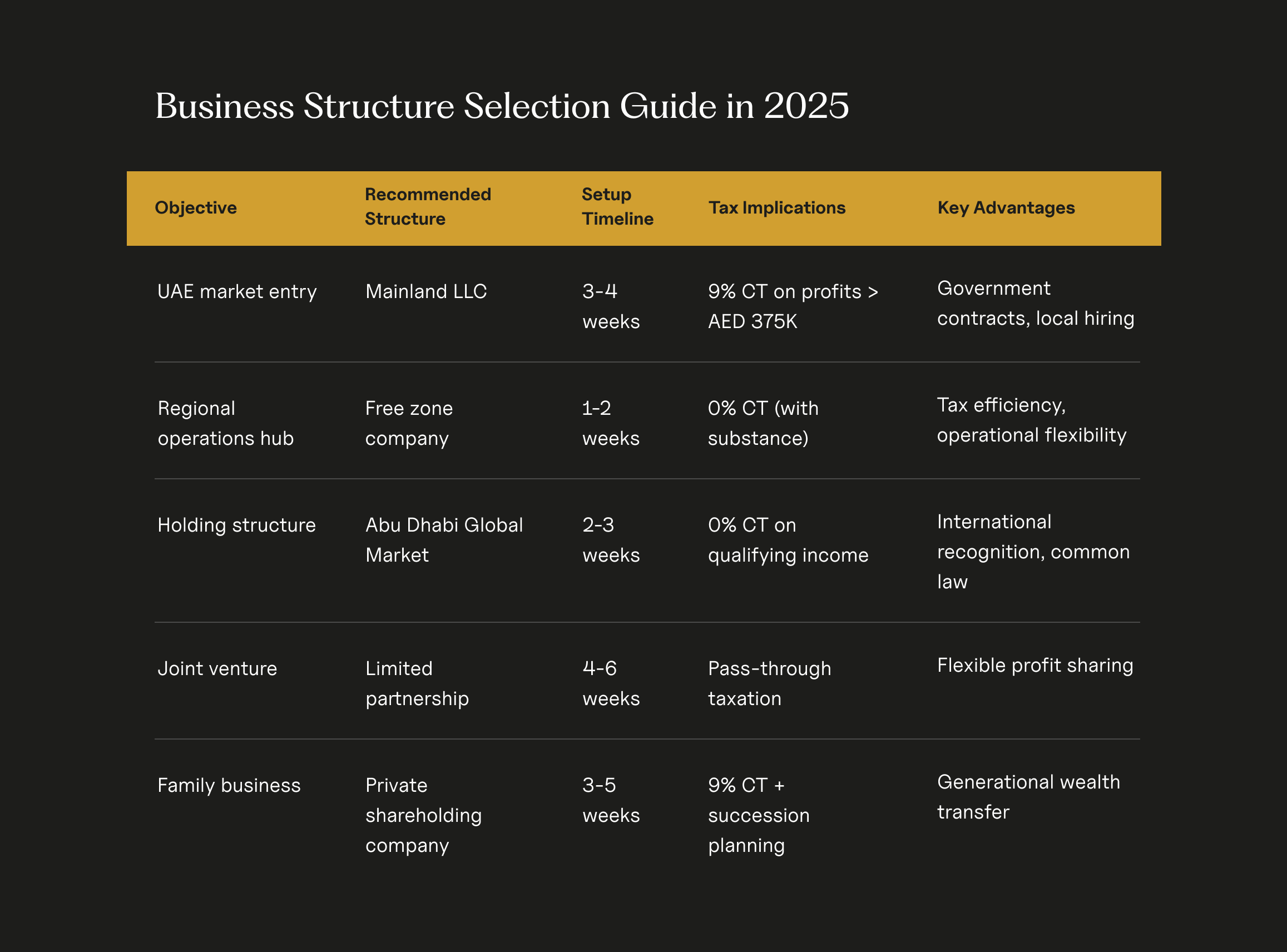Executive Summary: The UAE's corporate legal landscape continues its rapid evolution in 2025, with significant changes to tax regulations, foreign ownership rules, and compliance requirements reshaping how businesses operate. Companies that proactively adapt to these changes while leveraging new opportunities will maintain competitive advantages, while those that lag risk regulatory penalties and missed growth opportunities.
Key 2025 Statistics:
- 94% of UAE businesses report increased compliance complexity since corporate tax introduction
- Foreign investment approvals increased 67% following ownership liberalization
- Average corporate legal compliance costs rose 23% in 2024
- 78% of multinational companies restructured UAE operations for tax optimization
The UAE's position as a global business hub has never been stronger, but the regulatory environment continues to evolve at an unprecedented pace. From the ongoing implementation of corporate tax frameworks to new foreign investment regulations and enhanced ESG compliance requirements, 2025 represents a pivotal year for corporate legal strategy in the Emirates.
Major Corporate Law Developments in 2025
UAE Corporate Tax Law Implementation and Refinements
UAE Corporate Tax: Corporate Tax (CT) is a 9% federal tax on business profits exceeding AED 375,000 annually. Introduced June 2023, it applies to all UAE businesses except oil/gas extraction companies and certain qualifying free zone entities meeting substantial activity requirements.
The UAE corporate tax law framework, introduced in 2023, has undergone significant refinements throughout 2024 and into 2025. These changes reflect the UAE's commitment to maintaining its competitive edge while meeting international tax transparency standards. The Federal Tax Authority continues to provide updated guidance and clarifications on corporate tax obligations.
Key 2025 Updates to Corporate Tax Regulations:
The Federal Tax Authority has issued several clarifying resolutions addressing complex scenarios that emerged during the initial implementation period. Most notably, the treatment of free zone entities has been further refined, with specific guidance on substantial activity requirements and the conditions under which free zone tax benefits can be maintained.
Transfer Pricing Documentation Requirements: New regulations require multinational enterprises with UAE operations to maintain comprehensive transfer pricing documentation. Companies with related-party transactions exceeding AED 200 million annually must prepare detailed economic analyses justifying their pricing methodologies.
Digital Services Tax Implications: The UAE has introduced specific provisions addressing digital economy transactions, particularly affecting technology companies and platforms operating across multiple jurisdictions. These rules require careful analysis of where economic value is created versus where legal contracts are executed.
Group Relief Provisions: Enhanced group relief mechanisms allow UAE corporate groups to optimize their tax positions through loss transfers and consolidated reporting, provided specific ownership and control requirements are met.
Foreign Investment and Ownership Liberalization
Foreign Ownership Rules: UAE Commercial Companies Law now permits 100% foreign ownership in most sectors (previously limited to 49%). Strategic sectors like banking, telecommunications, and oil/gas maintain ownership restrictions requiring local partnerships or specific approvals.
The UAE's continued liberalization of foreign ownership restrictions has created new opportunities while introducing additional compliance complexities. The Commercial Companies Law amendments have expanded sectors where 100% foreign ownership is permitted, but implementation varies significantly across emirates and business activities.
Sector-Specific Developments: Manufacturing, agriculture, and renewable energy sectors have seen the most significant liberalization, with streamlined procedures for foreign investment approvals. However, strategic sectors including telecommunications, banking, and defense continue to maintain ownership restrictions that require careful structuring.
Free Zone Integration: The relationship between mainland and free zone operations has become increasingly sophisticated, with new hybrid structures allowing companies to optimize their operational footprint while maintaining compliance with both mainland and free zone regulations.
Compliance Priorities for UAE Businesses in 2025
Enhanced Due Diligence and KYC Requirements
Ultimate Beneficial Ownership (UBO): UBO refers to the natural person(s) who ultimately own or control 25% or more of a company's shares or voting rights. UAE law requires companies to maintain detailed UBO registers and report changes within 15 days to avoid penalties up to AED 1 million.
Ultimate Beneficial Ownership (UBO) Disclosure: The UAE's UBO register requirements have been strengthened, with enhanced verification procedures and increased penalties for non-compliance. Companies must now maintain detailed documentation of ownership structures extending through multiple corporate layers, as mandated by the Ministry of Economy's business regulations.
Sanctions Compliance Framework: With evolving international sanctions regimes, UAE businesses face increased scrutiny regarding their international business relationships. The UAE's own sanctions framework has become more sophisticated, requiring companies to implement robust screening procedures for customers, suppliers, and business partners.
ESG and Sustainability Compliance
ESG Compliance: Environmental, Social, and Governance (ESG) compliance involves meeting sustainability standards for environmental impact, social responsibility, and corporate governance. UAE companies with revenue over AED 1 billion must publish annual ESG reports starting 2024.
Corporate Sustainability Reporting: Large UAE companies are now subject to mandatory sustainability reporting requirements aligned with international ESG standards. These requirements extend beyond environmental matters to encompass social impact metrics and governance transparency measures.
Green Finance Regulations: The UAE's push toward sustainable finance has introduced new regulatory frameworks for green bonds, sustainable investment funds, and ESG-compliant corporate financing. Companies seeking to access green finance markets must demonstrate compliance with detailed environmental and social criteria.
Sector-Specific Regulatory Changes
Financial Services Evolution
The UAE's financial services sector continues to lead regional innovation while maintaining robust regulatory oversight. The Central Bank's regulatory framework has expanded through its regulatory sandbox program, allowing fintech companies to test innovative products under relaxed regulatory requirements.
Digital Asset Regulation: The UAE has emerged as a leader in cryptocurrency and digital asset regulation, with comprehensive frameworks governing virtual asset service providers, initial coin offerings, and digital payment systems. The Central Bank of the UAE provides detailed guidance for companies operating in this space, which benefit from regulatory clarity while facing substantial compliance obligations.
Islamic Finance Modernization: Traditional Islamic finance principles are being adapted to accommodate modern business structures and international investment flows, creating new opportunities for Sharia-compliant corporate financing and investment vehicles.
Technology and Innovation Sectors
Data Protection and Cybersecurity: The UAE's data protection laws have been substantially enhanced, with new requirements for cross-border data transfers, breach notification procedures, and privacy impact assessments. Companies processing personal data must implement comprehensive privacy governance frameworks.
Intellectual Property Protection: Enhanced IP protection mechanisms support the UAE's knowledge economy transformation, with streamlined procedures for patent and trademark registration and strengthened enforcement mechanisms against IP infringement.
Strategic Corporate Structuring Considerations

Company Formation and Restructuring
Corporate Restructuring: Corporate restructuring involves changing a company's legal, ownership, operational, or capital structure to improve efficiency, reduce costs, or meet regulatory requirements. In the UAE, this often includes redomiciliation, merger consolidation, or spin-offs.
The evolving regulatory landscape has created new opportunities for optimizing corporate structures while maintaining full compliance with UAE law. Modern corporate restructuring strategies must account for tax efficiency, regulatory compliance, and operational flexibility.
Holding Company Structures: UAE holding company regimes have become increasingly attractive for regional and international businesses seeking to optimize their Middle East operations. These structures offer tax advantages while providing operational flexibility for managing diverse business portfolios.
Cross-Border Merger and Acquisition Frameworks: Enhanced M&A regulations facilitate international transactions while ensuring appropriate regulatory oversight. Foreign investors benefit from streamlined approval processes for strategic acquisitions in non-restricted sectors.
Mergers & Acquisitions and Joint Ventures
Definition Box - Competition Law Compliance: UAE competition law prohibits anti-competitive practices including market abuse, cartels, and concentrations that substantially reduce competition. M&A transactions exceeding AED 100 million market share thresholds require mandatory notification to competition authorities.
The UAE M&A market remains robust, driven by economic diversification initiatives and international investment flows. However, regulatory complexity requires sophisticated legal analysis to navigate approval processes and compliance requirements.
Competition Law Compliance: The UAE's competition law framework has matured significantly, with enhanced merger control procedures and increased scrutiny of market concentration. Large transactions require comprehensive competition analysis and may trigger mandatory notification requirements.
Foreign Direct Investment Screening: New FDI screening mechanisms evaluate foreign investments in strategic sectors, requiring detailed analysis of national security implications and economic impact assessments.
Corporate Records and Compliance Issues
Maintaining comprehensive corporate records and ensuring ongoing compliance has become increasingly complex as regulatory requirements expand across multiple jurisdictions and regulatory bodies.
Digital Transformation Requirements: Companies must implement robust digital record-keeping systems that ensure data integrity while providing regulatory authorities with timely access to required information.
Cross-Jurisdictional Compliance: Businesses operating across multiple UAE emirates and free zones must navigate overlapping regulatory requirements while maintaining consistent governance standards.
Technology's Impact on Corporate Compliance
Regulatory Technology (RegTech) Adoption
UAE businesses are increasingly leveraging technology solutions to manage compliance obligations efficiently. Advanced analytics, artificial intelligence, and automated reporting systems enable real-time compliance monitoring while reducing operational costs.
Automated Compliance Monitoring: Sophisticated software solutions track regulatory changes across multiple jurisdictions, automatically updating compliance procedures and flagging potential issues before they become violations.
Digital Audit Trails: Blockchain and distributed ledger technologies provide immutable records of corporate transactions and compliance activities, enhancing transparency while reducing audit costs.
Digital Government Initiatives
The UAE government's digital transformation initiatives have streamlined many corporate compliance processes while introducing new technological requirements.
Digital-First Licensing: Most business licensing and permit applications can now be completed entirely online, reducing processing times while requiring companies to maintain digital-ready documentation and systems.
Smart Contract Integration: Government agencies are piloting smart contract systems for certain regulatory processes, automating compliance verification and reducing administrative burdens for compliant businesses.
Risk Management and Mitigation Strategies
Proactive Compliance Framework Development
Regulatory Change Management: Successful UAE businesses implement systematic processes for monitoring regulatory developments, assessing impact on their operations, and implementing necessary changes before compliance deadlines.
Cross-Functional Compliance Teams: The complexity of modern UAE corporate law requires integrated compliance teams combining legal expertise, tax knowledge, operational understanding, and technology capabilities.
Crisis Preparedness and Response
Regulatory Investigation Preparedness: Companies should maintain detailed response protocols for potential regulatory investigations, including document preservation procedures, communication strategies, and legal representation arrangements.
Business Continuity Planning: Regulatory compliance considerations must be integrated into business continuity planning, ensuring that compliance obligations can be maintained even during operational disruptions.
Industry-Specific Compliance Trends
Healthcare and Life Sciences
The UAE's healthcare sector faces evolving regulatory requirements driven by quality improvement initiatives and international alignment efforts. Medical device regulations, pharmaceutical licensing, and telemedicine frameworks continue to develop rapidly.
Medical Technology Innovation: Regulatory sandboxes for medical technology allow innovative companies to test new solutions while maintaining patient safety standards.
Real Estate and Construction
Construction and real estate development regulations have been enhanced to support sustainable development goals while maintaining investor confidence in property markets.
Green Building Standards: Mandatory sustainability certifications for new developments require comprehensive environmental compliance planning from project inception.
Energy and Utilities
The UAE's energy transition creates new regulatory frameworks for renewable energy projects, carbon trading mechanisms, and sustainable infrastructure development.
Clean Energy Incentives: Regulatory frameworks supporting renewable energy investment provide significant opportunities while requiring compliance with technical and financial criteria.
Looking Ahead: 2026 and Beyond
Anticipated Regulatory Developments
International Tax Cooperation: The UAE's participation in global tax transparency initiatives will likely introduce additional reporting requirements for multinational businesses.
Digital Economy Regulation: Continued evolution of digital business regulation will address emerging technologies including artificial intelligence, IoT applications, and advanced data analytics.
Regional Integration: Enhanced GCC economic integration may create new cross-border compliance requirements while providing expanded market access opportunities.
Strategic Positioning for Future Success
Compliance as Competitive Advantage: Companies that excel at regulatory compliance will increasingly gain competitive advantages through reduced regulatory risk, enhanced stakeholder confidence, and improved access to capital markets.
Technology-Enabled Compliance: Investment in compliance technology infrastructure will become essential for managing increasing regulatory complexity while maintaining operational efficiency.
Expert Legal Guidance for Corporate Success
Pierre Kayrouz - Chief Legal Officer
Pierre Kayrouz brings over 24 years of experience in UAE corporate law, having guided multinational corporations, institutions, and entrepreneurs through complex regulatory environments. His expertise spans corporate structuring, regulatory compliance, and strategic transaction planning.
Pierre's deep understanding of UAE corporate law evolution positions him uniquely to help businesses navigate current regulatory requirements while preparing for future developments. His experience with major corporate transactions and regulatory matters provides clients with practical insights that go beyond theoretical legal analysis.
Pierre regularly advises on corporate structuring, shareholder disputes, and contract negotiations. His ability to synthesize complex regulatory requirements into actionable business strategies makes him an invaluable advisor for companies operating in the UAE's dynamic business environment.
Lathamani Chandrashekar - Senior Corporate Counsel
Lathamani Chandrashekar is a senior corporate counsel with over 14 years of experience advising clients across corporate and commercial law, international transactions, and regulatory compliance. Her practice encompasses high-stakes negotiations, governance frameworks, and cross-border transaction structuring.
Lathamani has played key legal roles in major corporate transactions, including cross-border acquisitions and complex restructuring projects. Her experience spans multiple industries including oil and gas, real estate, and international business, providing clients with sector-specific insights combined with broad commercial understanding.
She holds certifications in DIFC laws, anti-money laundering compliance, and privacy law, reflecting her commitment to staying current with evolving regulatory requirements. Her recent role as General Counsel at AMIT International Group in Dubai involved leading contract management, corporate structuring, and compliance functions across multiple jurisdictions.
Lathamani advises on entity formation, shareholder agreements and disputes, and cross-border transactions. She supports corporate clients through every stage of business growth, offering counsel on structuring, governance, and regulatory alignment across jurisdictions.
Strategic Partnership for Corporate Excellence
The complexity of UAE corporate law in 2025 requires legal partners who combine deep local expertise with international perspective. Our corporate and commercial law team provides comprehensive support for businesses navigating the UAE's evolving regulatory landscape.
Whether you're establishing new operations, restructuring existing businesses, or planning strategic transactions, our team provides the sophisticated legal analysis and practical guidance necessary for success in the UAE's dynamic business environment.
Ready to ensure your corporate compliance strategy positions your business for success? Contact our experienced legal team to discuss your specific requirements and develop a comprehensive approach to UAE corporate law compliance.
Email: [email protected]
Phone: +971 4 8761744
Don't let regulatory complexity slow your business growth. Our expert corporate legal team helps you navigate UAE corporate law changes while capturing new opportunities for expansion and success.
Related Resources:
- Business Formation and Incorporation Strategies
- Commercial Contracts and Compliance
- Corporate Governance and Public Companies
Official UAE Government Resources:
- UAE Corporate Tax Law and Regulations
- Federal Tax Authority Official Portal
- UAE Central Bank Regulations and Guidelines
- Ministry of Economy Business Resources
- UAE Business Regulations Portal
- National Economic Register
- UAE Federal Legislation Database
Your success starts with the right guidance.
Whether it’s business or personal, our team provides the insight and guidance you need to succeed.


